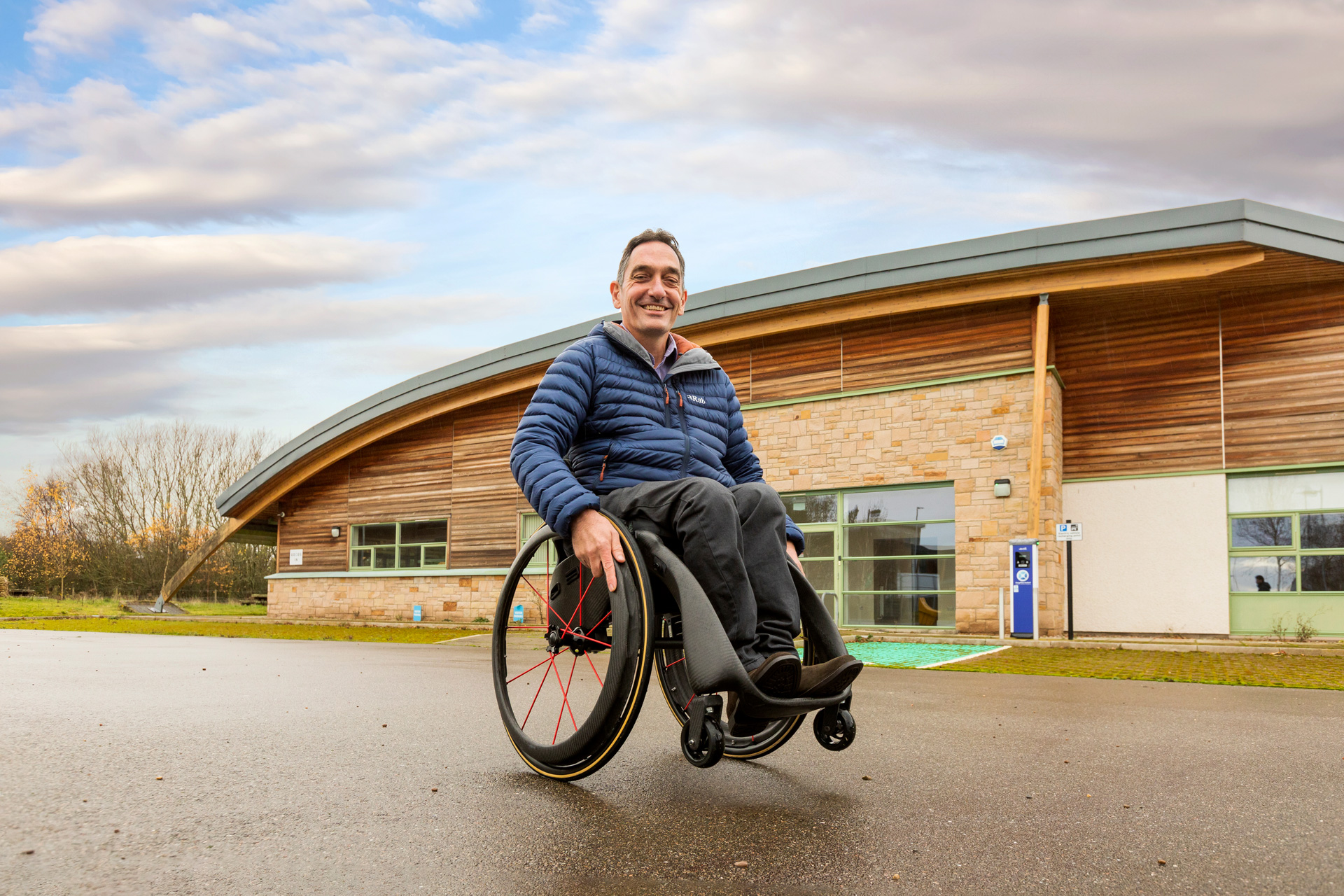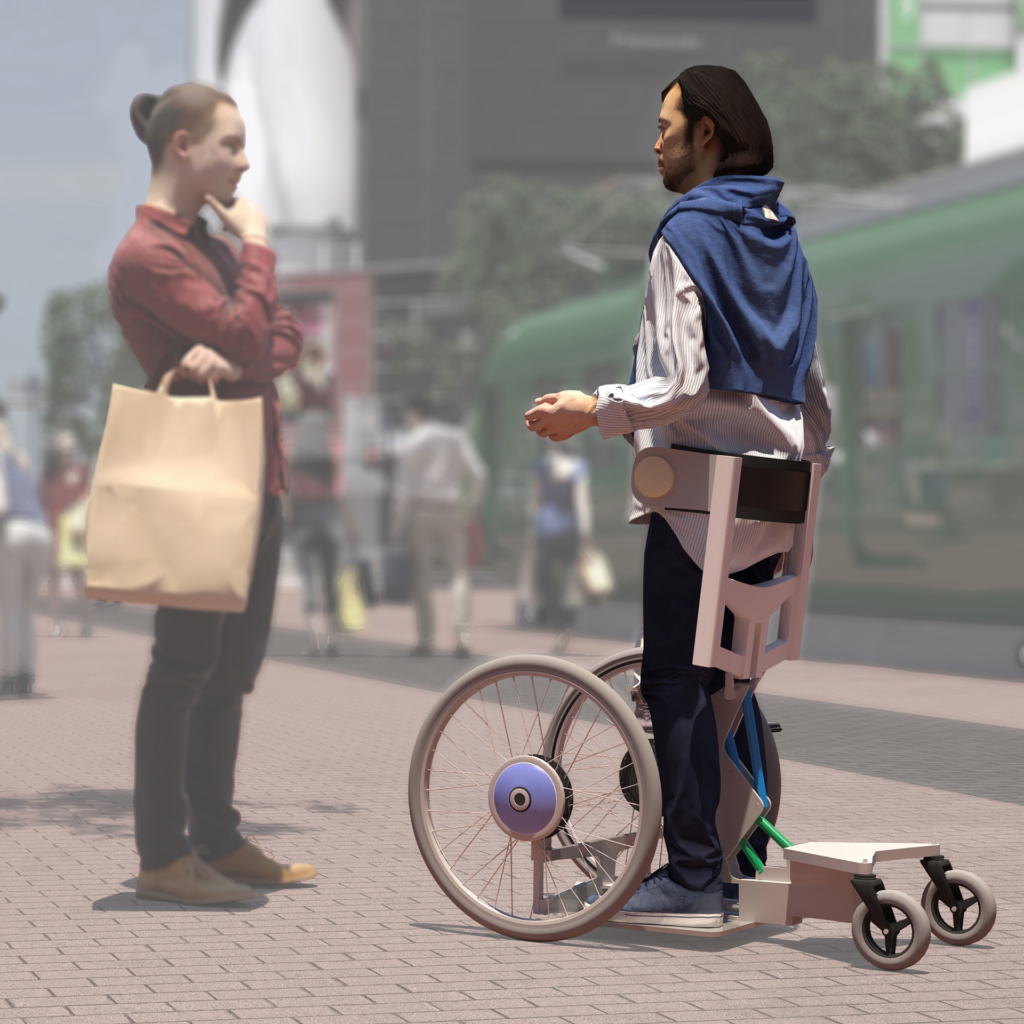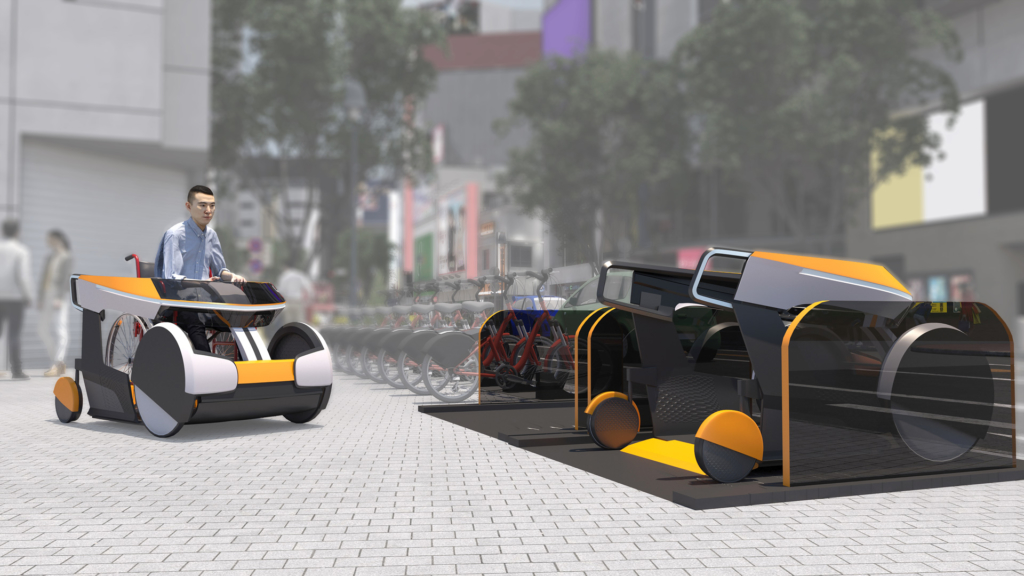Mobility Unlimited Challenge winner receives $1m for ultra-lightweight intelligent wheelchair
The winner of the three-year Mobility Unlimited Challenge has now been announced with Phoenix Instinct from the UK receiving $1 million to further develop their intelligent ultra-light carbon fiber wheelchair, bring it to market, and ultimately, transform millions of lives in the disability community for the greater good.

Andrew Slorance CEO Phoenix Instinct, Toyota Mobility Foundation
Toyota Mobility Foundation December 22, 2020
LONDON – The Toyota Mobility Foundation, established by Toyota in 2014, launched the $4 million global challenge back in 2017 in partnership with Nesta Challenges, in a bid to drive innovation in the field of assistive technologies for people with lower-limb paralysis in a demonstration of Toyota’s mission of Mobility for All and further vision of producing happiness for all.
The Challenge called for talented engineers, innovators, and designers from around the world to submit their designs for groundbreaking devices, integrated with the latest technologies, to enhance the mobility and independence of end users. Over eighty teams from 28 countries around the world entered.
Among the semi-finalists announced in 2018 was Human in Motion Robotic Inc. from Vancouver BC, for their project Exomotion: the most advanced, full mobility wearable robotic exoskeleton. This solution assists in improving the quality of life for users through fully wearable robotic systems that completely or partially support their weight and provide controlled guidance of leg movements, allowing them to stand and walk.
The University of Pittsburgh’s Human Engineering Research Laboratories (HERL) led the assessment of the entries and provided mentorship alongside a team of Toyota subject matter experts, and the winner was chosen by a panel of expert judges.
Designed by Phoenix Instinct, the Phoenix i uses intelligent systems to automatically adjust its center of gravity, making the ultra-lightweight carbon fiber frame extremely stable and easier to maneuver. It uses front-wheel power-assist to reduce painful vibrations and minimize strain on the user. The chair’s intelligent powered braking system automatically detects when the user is going downhill and adjusts to manage the user’s descent.
Andrew Slorance from Phoenix Instinct said: “Winning the Toyota Mobility Unlimited Challenge is incredible for Phoenix Instinct and for wheelchair users. The wheelchair as we know it has been technologically unchanged for decades. The funding we received through the Challenge allowed us to prove smart technology makes for an easier to use and safer wheelchair with the potential for a suite of new features. With the prize money we can now advance this work and bring the Phoenix I wheelchair to the consumer.
It’s a very exciting time with Toyota moving into the mobility sector, we’re going to see significant advances in mobility devices. At Phoenix Instinct we’re thrilled to be leading the smart wheelchair revolution.”
| The Phoenix i is the first ever wheelchair to Intelligently configure itself on the move. The i adjusts its COG (centre of gravity) to stay in sync with the user’s COG. At all times the i maintains minimum weight through the front wheels reducing drag for vastly easier pushing and turning. Leaning forward or sitting back the chair will respond with the user so it won’t over balance and tip. If you hang a heavy bag off the back of the Phoenix i the chair will know and will adjust the centre of gravity so the chair doesn’t become tippy. The result of intelligent centre of gravity is a chair that feels completely in sync with the user pushing it. Phoenix Instinct. Youtube Dec 14, 2020 |
Sir Philip Craven, member of the Board of Directors at Toyota Motor Corporation and former President of the International Paralympic Committee shared: “Mobility means freedom. It means liberation from being limited in life. As we believe at Toyota, when we are free to move, we are able to fully participate in society, and I’m excited for each of these devices supported by the Mobility Unlimited Challenge, particularly the winning device, because of how it will allow so many people to better do what they want to do.”
Ryan Klem, Director of Programs for Toyota Mobility Foundation commented: “The entire competition has been an enriching journey for us all, bringing together the efforts of many experts, mentors, advocates, and more to invest in the five finalists to develop their devices and bring them into the lives of people that need them. We are thrilled to announce Phoenix Instinct as the winner of the Mobility Unlimited Challenge.
The judges were impressed by the way the device incorporated intelligent systems in its design in a way that represents a true advance for the wheelchair and could see it having a clear route to market. TMF is dedicated to continuing to support these passionate teams, and we hope, through this process, that all the teams are able to find resources to do the same as they have all shown incredible creativity and innovation. We believe this Challenge will result in huge improvements in assistive technology and are extremely proud of what all of the teams have achieved.”
Liz Vossen of Nesta Challenges said: “For too long, the disability community has faced restricted mobility and accessibility. The coronavirus pandemic has forced a change in attitudes towards remote working, showing that it is possible to be present and productive at home. However, the pandemic also highlighted the need for non-disabled people to have a better understanding of the importance of mobility for all. We hope that these devices will improve the mobility of people across the world and contribute to a more inclusive future.”
| Mobility Unlimited Challenge Finalist Journey. Learn more about the journey of the five Finalists throughout the Mobility Unlimited Challenge. Toyota Mobility Foundation. Youtube Dec 17, 2020 |
The four other finalists were:
Evolution Devices (United States) — a smart wearable stimulator that goes right below the knee and uses artificial intelligence to support your muscles at the right time aiding in rehabilitating walking and preventing falls for people with foot drop.

Evolution Devices’ Evowalk stimulates muscles to help users walk. Evolution Devices, Toyota Mobility Foundation
The Evowalk, Evolution Devices, Toyota Mobility Foundation Qolo (Quality of Life with Locomotion) Team Qolo, University of Tsukuba (Japan) — a standing mobility device that integrates exoskeleton and wheelchair functions. It supports the function of standing and sitting with a passive assist mechanism for people with lower limb paralysis.

Qolo (Quality of Life with Locomotion), Toyota Mobility Foundation
Quix: IHMC & MYOLYN (United States) — a highly mobile, powered exoskeleton offering fast, stable and agile upright mobility.

Quix: IHMC & MYOLYN (United States), Toyota Mobility Foundation
Wheem-i: Italdesign (Italy) — a wheel-on semi-autonomous electric device that provides ride sharing for wheelchair users. It is primarily designed for micro mobility and is usable on a variety of surfaces.

Wheem-i: Italdesign (Italy), Toyota Mobility Foundation
At its core, the Challenge was developed to highlight the importance of collaboration with end-users and create inventions with the disability community in mind. It supports the UN’s Sustainable Development goals, specifically Goal #10 of reducing inequalities in supporting devices that help people with paralysis better access society for economic, social, educational and other opportunities.
Key specifications for choosing the winning invention included devices that will integrate seamlessly into people’s lives and environments while being comfortable and easy to use, enabling greater independence and increased participation in daily life. The judging criteria was based on innovation, insight and impact, functionality and usability, quality and safety, and market potential and affordability.
Around the world, millions of people are living with lower-limb paralysis (the most common causes being strokes, spinal cord injury and multiple sclerosis). While there are no statistics on paralysis worldwide, the World Health Organization estimates there are 250,000-500,000 new cases of spinal cord injury globally every year.
Source Toyota Mobility Foundation
| About Toyota Mobility Foundation |
| The Toyota Mobility Foundation was established in August 2014 to support the development of a more mobile society. The Foundation aims to support strong mobility systems while eliminating disparities in mobility. It utilizes Toyota’s expertise in technology, safety, and the environment, working in partnership with universities, governments, non-profit organizations, research institutions and other organizations to address mobility issues around the world. Programs include resolving urban transportation problems, expanding the utilization of personal mobility, and developing solutions for next generation mobility. |
Also see
Andrew Slorance’s Phoenix I Smart Wheelchair Wins the $1 Million Toyota Mobility Challenge New Mobility
Omni’s ‘globetrotter’ combines with a scooter to create an electric wheelchair designboom
Refining Your Manual Wheelchair New Mobility
